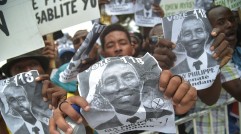'Mañana Means Heaven' Author Tim Z. Hernandez Helps Shape American Latino Legacy One Work at a Time
"Mañana Means Heaven" author Tim Z. Hernandez pays respect to his heritage and his family each time he writes stories about the people, experiences and realities that he and his family come from. The characters, flavors, rhythms and aromas of California's San Joaquin Valley inform the poetry and stories that Hernandez writes, influencing the development of his collection of poetry, "Natural Takeover of Small Things," his hard-boiled fictional novel "Breathing, In Dust" and the portrait-painting historical work "Mañana Means Heaven."
Hernandez was born to migrant farmworkers in south Texas who relocated to a predominantly farmworker community in California, principally populated with Latino, Hispanic, Chicano and Mexicano families. He attended Cutler School Elementary, located in the heart of California's Central Valley, where teachers honored and celebrated the value of heritage and culture with students nearly every day, effectively boosting esteem and pride in heritage.
"Children should be taught that the appreciation of their heritage does not merely occur once a year, each fall, but it happens every single day of their lives. Every time they look in the mirror they should find every reason to celebrate themselves," Hernandez told Latin Post. "Every day was Hispanic Heritage Month."
At Cutler, Hernandez committed his adolescence to creativity, visual arts, writing and acting, among other things. He participated in poetry recitations and frequently performed in school plays. Likewise, as a teen, he focused his energies on drawing and painting. Since youth, each of his performances and creative projects has addressed larger themes: humanity, peace and compassion for one another, regardless of culture or background.
The American Latino legacy consists of millions of singular efforts to create a unique voice, producing a resounding collective sound. Hernandez is mindful of categories that present "a duality or multiplicity." Latino is one aspect of who he is. Additional categories (e.g., man, son, father, husband, writer and professor) are just as relevant and contribute just as much to the legacy.
"The legacy I work toward has less to do with writing, and more to do with the inherent power of our individual and collective stories. Writing is only one vehicle. Art, music, painting, dancing, cooking, these are other vehicles. My only hope is that through my stories, and the way in which I live my life, I can teach others how vital and fantastic all of our stories truly are. Stories and the act of sharing of stories are medicine, which is why we gravitate toward narratives every day," Hernandez said. "It's why we feel compelled to 'tell' one another what happens in our days, in our lives. It's also why we listen."
Hernandez's perspective is informed by his upbringing, his community and the reality of the roles that he's assigned. He explained that he is the sum of his experiences, and yet he can transcend them, and because of that understanding, he's "not bound by the idea of Latinismo."
"Mañana Means Heaven" and Hernandez's upcoming work "All They Will Call You," an account of 28 Mexican "deportees" who died in a plane crash, challenges the nation's understanding of Latino culture, as they challenge the concept of history itself by asking questions about perspective, intention and omission.
"In the case of my book 'Mañana Means Heaven,' you have a famous American novelist, Jack Kerouac, whose ground-breaking novel 'On the Road' was accepted for publication because of a story he wrote about his affair with a 'Mexican girl,'" Hernandez said. "Her real name was Bea Franco. Since the publication of Kerouac's book, in 1957, Bea's name has appeared in over 22 Kerouac biographies, which sit on non-fiction bookshelves the world over. Yet, not one of these biographers interviewed Bea herself, or even asked her for permission. She went her entire life, until her death at age 92, never knowing of her own legacy, her own role in this famous American novel. Still, you have all these books that claim to tell some aspect of her life, yet they have only accepted Kerouac's version as truth. "
"All They Will Call You" tells a grand story about 28 Mexicans following a fatal plane crash in 1948 in Fresno County. American songwriter Woody Guthrie sympathized with these "deportees" and wrote a song, titled "Deportees (Plane Wreck at Los Gatos)," which was recorded by Bob Dylan, Willie Nelson, Dolly Parton, and others. Pete Seeger also recorded the song in 1957.
"In 2010, I went searching for the names, and when I found them, I then began looking for their surviving family members," Hernandez said. "In short, the narrative of my book is partially told by their families, through interviews, photographs, documents, etc. ... And it aims to answer the question Woody posed in his song 66 years ago, 'Who are these friends all scattered like dry leaves?' My book will tell you that not only do they have names, they have faces and stories, a history of their own."
Hernandez finds inspiration in the work of Luis Alberto Urrea, who creates vital and timely stories that, on and off the page, transcend color lines and political ideologies. Hernandez also said that Laurie Ann Guerrero and Jessica Helen Lopez were "both the Poet Laureates of their city," and Juan Felipe Herrera "has been doing with poetry and communities [that which] has been nothing short of miraculous." He clarified that he was "generally grateful for [authors, who] are not only making contributions to American letters but are going a step further -- that is, getting out from behind their cozy desks and utilizing the written word as a vehicle for positive change in the world."
To learn more about Tim Z. Hernandez, visit his website and follow him on Twitter. And be sure to check out the other pieces in our Latino Author Series, which includes Daisy Hernandez, Sandra Lopez and Cecilia Fernandez, and many more.
Subscribe to Latin Post!
Sign up for our free newsletter for the Latest coverage!











